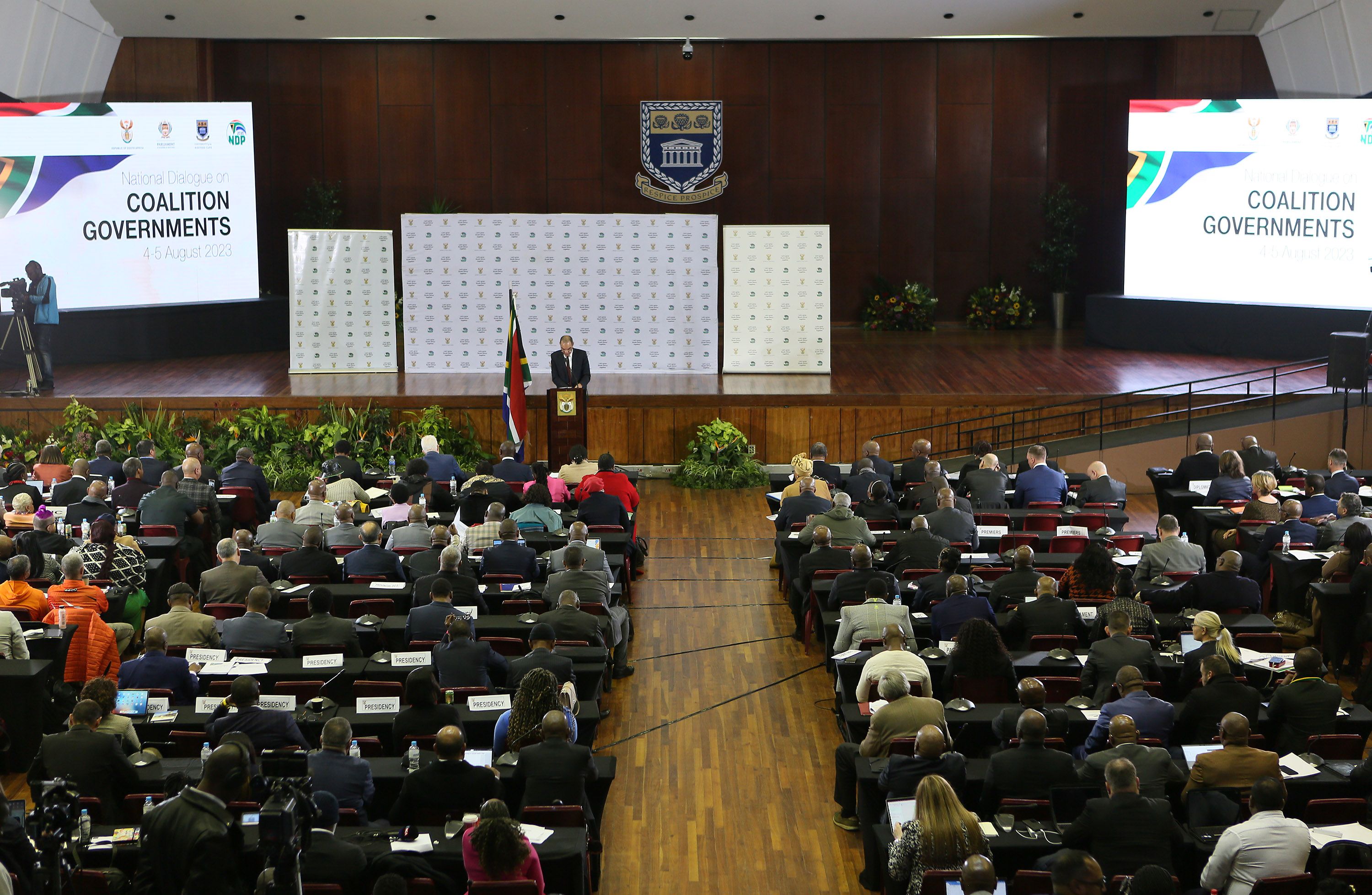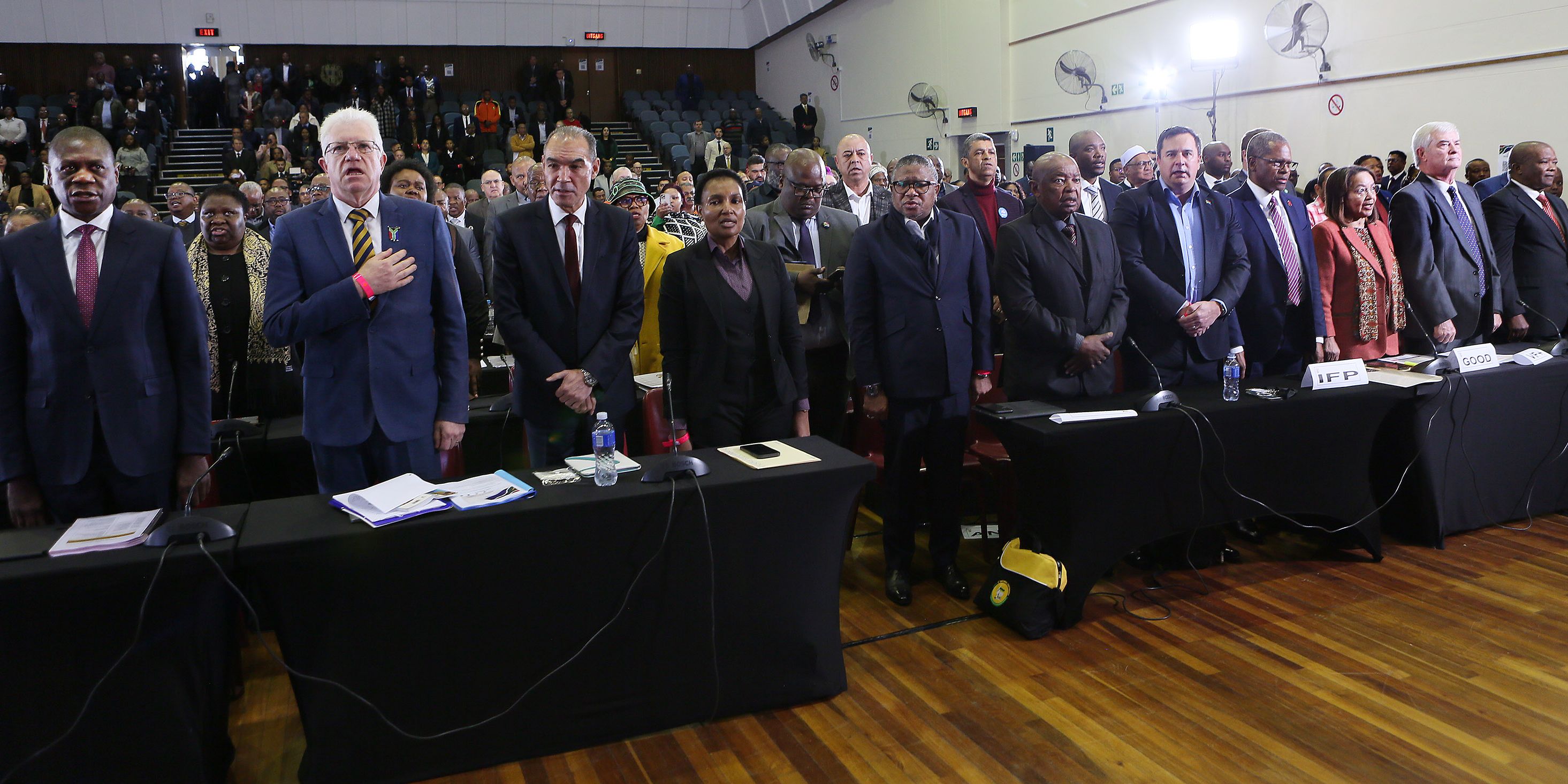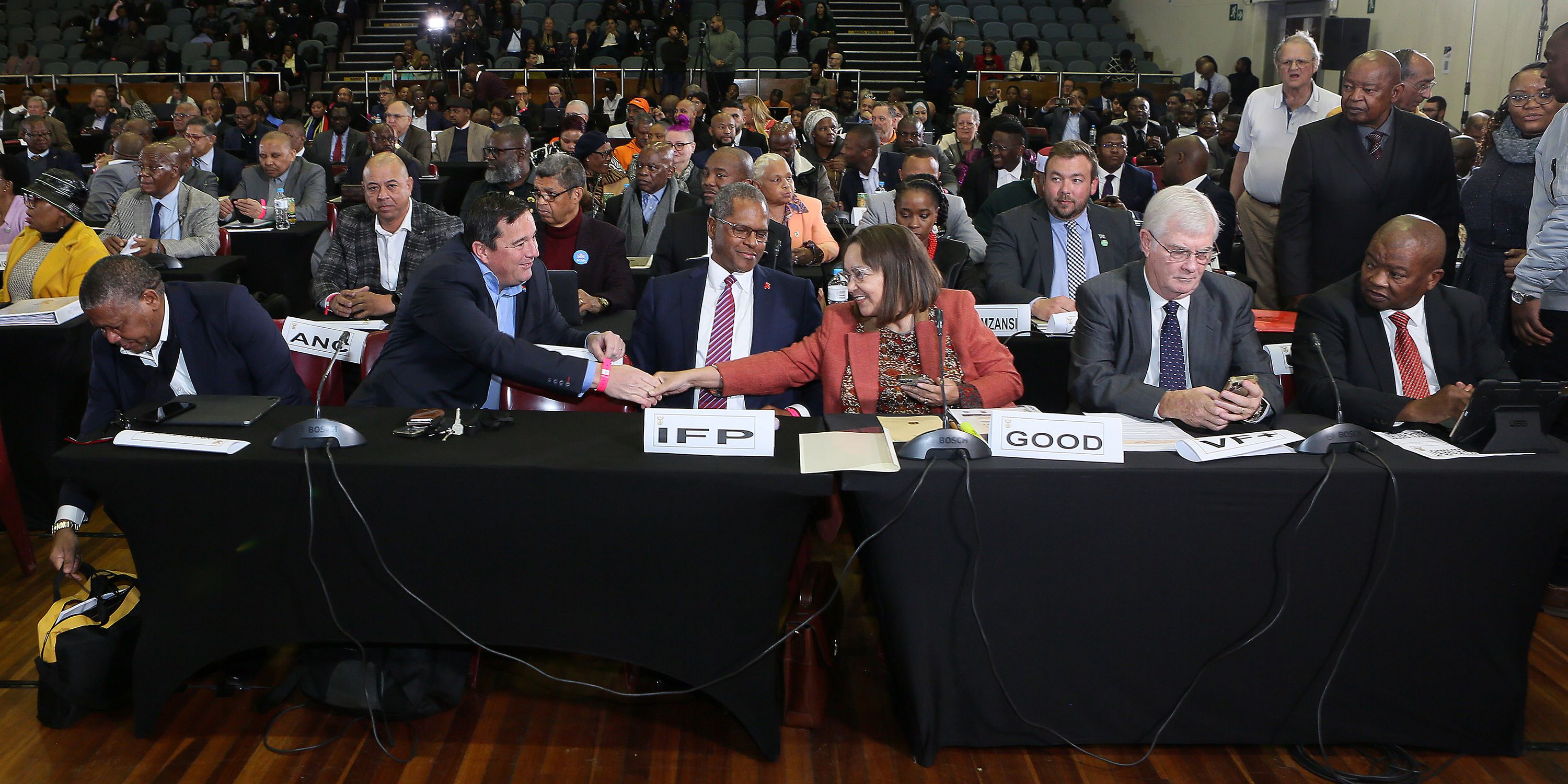The National Coalition Dialogue, which started on Friday at the University of the Western Cape, has introduced a possible conundrum which could stifle the growth of smaller parties at Parliament and local government level.
While the DA and ANC barely agree on anything, in this case, both parties are of the view that the current proportional representation system has unfairly granted parties with the least voters immense muscle to sway decision-making at government level.
The FF+, Good and ATM are some parties that disagree with this stance as they believe it is not in the favour of democracy to do so.
Speaking at the dialogue, FF+ leader Pieter Groenewald said that proportionality favours coalitions and sharply disagreed that the party which has received the largest amount of votes should lead a multiparty government.
“This will not be conducive, and undermine the fabric of coalitions. Threshold will create divisions by excluding minority groups and independent candidates,” he said.
The ATM’s Vuyo Zungula believes that it is important that diverse voices of our nation be represented and this is possible through the PR system.
“The concept of imposing a threshold for participation in a coalition is nonsensical. The absence of a clear winner in the elections signifies voter dissent and indecision, calling for inclusive negotiations rather than exclusions. No one should seek power through the back door.
“If a party gets below 50%, they have lost the election and the new government will be formed by a number of parties who have all lost the election on their own. So, to say that a party that has the most votes even if they fall shy of the 50% should be the ones who lead the coalition is ridiculous to say the least,” he said.
 Political Coalition framework dialogue held at the University of Western Cape. 4 August 2023. Cape Town (Photo: Ruvan Boshoff/University of the Western Cape)
Political Coalition framework dialogue held at the University of Western Cape. 4 August 2023. Cape Town (Photo: Ruvan Boshoff/University of the Western Cape)
After delivering his remarks, the ATM leader then proceeded to stage a walkout.
Good leader Patricia De Lille scorned the proposal while making it clear the party’s hand will not be forced.
“We will not allow any of the other parties to bully us into submission to accept thresholds,” she reiterated.
‘Unstable’ coalitions
ANC secretary-general Fikile Mbalula delivered remarks about the future of coalition governments where he described the state of coalitions as “chaotic, unstable and dysfunctional” and the reason why service delivery in coalition municipalities has collapsed. He then presented the idea of introducing the threshold as a mechanism to reduce discord in government.
“A threshold should be introduced so that there is a degree of legitimacy with regard to what amount of electoral support qualifies a party or candidate to be part of councils and coalition governments,” he said.
The DA’s Parliamentary Chief Whip Siviwe Gwarube wants to introduce three pieces of legislation which will strengthen coalition governments.
In addition to this, she explained that the introduction of a threshold would not be unusual as the system is used the world over.
“Electoral votes should be inserted to equal the seat quota. Currently, there are parties who have seats but have less votes than the seat quota,” she explained.
Meanwhile, the EFF snubbed the event saying that the ANC’s involvement in the formulation of this framework exposes their impartiality and a blatant attempt to protect their fading support.
“ANC’s desperate attempt to facilitate how it should be removed from power, the EFF firmly asserts that the process is not one to be negotiated or presided over by an outgoing and dying ruling party. Our principled position is clear and uncompromising: everywhere the ANC is below 50%, opposition parties must unite to take the ANC out of power. Coalition government frameworks and discussions cannot, and must neither be negotiated nor presided over by those who cling to power while the people suffer,” the red berets said in a statement.
 Political Coalition framework dialogue held at the University of Western Cape. 4 August 2023. Cape Town (Photo: Ruvan Boshoff/University of the Western Cape)
Political Coalition framework dialogue held at the University of Western Cape. 4 August 2023. Cape Town (Photo: Ruvan Boshoff/University of the Western Cape)
Stabilising solutions
The increasing number of hung councils has forced the government to look at viable solutions which can curb discord and instability in multiparty governments. Hung municipalities have experienced a number of issues including constant motions of no confidence which exacerbate the existing service delivery problems.
Since 2016, the ANC has not won a majority of seats in the City of Joburg which led to the party losing power in SA’s biggest metro for the first time. The ANC regained control in 2019 through coalitions but was removed from power after the 2o21 local elections.
Recently the ANC- EFF marriage has succeeded in removing DA mayors in Ekurhuleni, Mogale City and Joburg. However, the mayoral positions in these municipalities are held by minority parties.
Read more in Daily Maverick: Till death do us part? ANC and EFF have a long/infinite road to real collaboration
Paul Mashatile leads coalition dialogue
“It is proposed that the National Dialogue must be viewed as part of nation-building because the nation-building project is fundamentally about mainstreaming social inclusion and nation formation in development plans and initiatives nationally, regionally, and locally.”
This is according to the concept discussion document on the Development of a Framework for Coalition Governments. The document looks at countries like Kenya, Germany, Belgium, Austria, and Malaysia for a comparative study as they have managed to successfully run coalition governments.
Read more in Daily Maverick: ANC’s coalition framework paints a bleak picture for DA and EFF in next year’s polls
“The specific socio-political culture and institutional conditions in these countries make it possible for coalitions to guarantee continuity of socio-economic development and service delivery, regardless of the dynamics in politics. Further, the professionalisation of public administration and the insulation of civil servants or public servants from political upheavals prevents these governments from being dysfunctional.
“Other factors include the level of economic development, the strength of democratic institutions and the degree of national consensus on how the country moves forward (e.g. post-war German consensus and social democracy in the Scandinavian countries),” the document reads.
Deputy President Paul Mashatile is leading coalition talks with various stakeholders which will be grounded on the following six principles to guide the framework for the dialogue between and among parties:
1. Putting the people first by making them the tenants of our value system in the formation of governments. In the spirit of Batho Pele, the measurement of the performance of coalitions must be about what we have done to improve the lives of the people.
2. “Coalition governments must be committed to combating poverty and deprivation, as well as building a growing and inclusive economy and must report regularly, by providing evidence on poverty reduction, growing the economy, and including the majority in the mainstream economy.
3. Coalition governments must contribute toward building a prosperous society in which people have access to land for productive purposes and are meaningfully participating in the economy.
Read more in Daily Maverick: Grand Coalition 2024? Veterans League’s Snuki Zikalala suggests DA is better partner for ANC
4. Coalition governments must be committed to building a non- racial, non-sexist, democratic, united, and prosperous society.
5. A coalition government should be bound together by a commitment to Good Governance, with no tolerance for corruption.
6. The party that has won the largest votes should be allowed to lead the coalition, and the executive positions should be allocated proportionally to the votes obtained by the coalition partners.
In his opening speech at the two-day dialogue, Mashatile reiterated the distressing features of coalition governments, including: “opportunistic political behaviour, enabled by institutional loopholes, the lack of a threshold for the admissibility of a motion of no confidence and the vulgarisation and proceduralisation of the process that are not related to considerations of ethics and competence, the monetisation of votes and seats in municipal governance patronage/rent-seeking, and;power-play and relevance; ganging up against incumbents.”
This discussion comes as opposition parties are preparing for their own convention which will be looking for coalitions. The grouping which is a working moonshot pact includes the DA, IFP, FF+ and newcomers ActionSA.
The DA’s proposal involves itself and smaller parties coming together to prevent the ANC and EFF from forming a coalition at the national level in 2024. The pact is based on the assumption that the ANC would get below 50% of the votes. DM




 Political Coalition framework dialogue held at the University of Western Cape. 4 August 2023. Cape Town (Photo: Ruvan Boshoff/University of the Western Cape)
Political Coalition framework dialogue held at the University of Western Cape. 4 August 2023. Cape Town (Photo: Ruvan Boshoff/University of the Western Cape) 